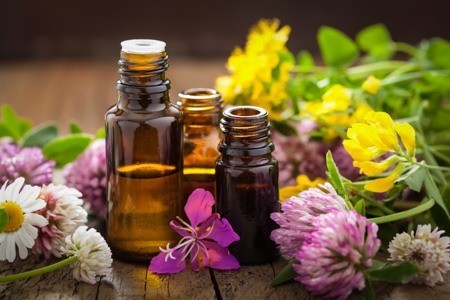More Holistic Health Articles
Aromatherapy Courses and Careers
Learn about careers in aromatherapy and get aromatherapy education and licensure info.

Aromatherapy can either supplement another healing art, such as massage or reflexology, or can be practiced on its own.
And as society continues to focus on wellness and health consciousness, aromatherapy careers are recognized as an excellent natural healing method to promote wellness and enhance mood through fragrant substances.
Learn more about aromatherapy careers, education, laws and licensure to begin your rewarding career today.
Aromatherapy Career
A diploma or certificate from an aromatherapy school is not a national certification and is not a ‘license to practice.’ Therefore, it is very important not to present yourself as a physician when you begin to practice aromatherapy.
Because of this, aromatherapy career opportunities after receiving an education in aromatherapy (depending on your other skills) can be widely varied.
Here are a few potential aromatherapy careers:
- aromatherapeutic counselor
- essential oil store manager
- essential oil production manufacturer
- custom aromatherapy blender for an aromatherapy bar
- community holistic health clinic participator
- aromatherapy consulting business entrepreneur
- essential oils retailer
- aromatherapy writer and book author
- aromatherapy tutor
Many also utilize their aromatherapy education as an added component to enhance an existing natural or allopathic health care practice. Often, trained aromatherapists successfully incorporate their newly gained knowledge into their current professional health care practice.
Professions that incorporate aromatherapy services
Many other fields incorporate the use of essential oils into their healing art to enhance desired effects, including:
- naturopaths
- massage therapists
- chiropractors
- sports massage therapists
- energy healers
- psychotherapists
- estheticians
- ayurvedic clinicians
- and practitioners of Chinese Medicine.
One resource that may be of assistance to newly-trained aromatherapy certification recipients is a book entitled The Business of Aromatherapy: The Insider’s Guide to Success by Katherine Graf.
This book covers a variety of topics on the ‘ins and outs’ of starting your own aromatherapy business from producing a business plan to advertising recommendations.
Although some do seek training in aromatherapy to enhance their current profession and others simply to enjoy better personal health, aromatherapy-specific career opportunities are growing as complementary medicine becomes a more widely accepted mode of health care.
Laws and Licensure
At this time, there’s no specific regulation of aromatherapists or aromatherapy.
Many practitioners incorporate it into their practice, especially that of the massage therapy profession, and the laws governing that practice are the ones that apply.
An aromatherapist with no other medical training or license generally works as a counselor or teacher and should follow whatever regulations apply to that profession in their area.
Aromatherapy Courses and Financial Aid
The majority of aromatherapy programs are night or weekend seminars and anyone can attend. A few programs are designed specifically for medical practitioners.
These generally require the student to either be enrolled in an appropriate college or to already have a degree/license in their area.
Professional aromatherapy seminars range from courses designed for massage therapists to courses designed for medical doctors.
The Cost of Aromatherapy Training
Programs average about $500, but may vary from region to region.
Aromatherapy Financial Aid
Here are some organizations that offer financial aid for aromatherapy students. Learn more by clicking on each type of loan opportunity listed below.
LendEDU is a blog that features a post offering a service that allows you to research and compare private loans and interest rates.
FinAid is a comprehensive public service website dedicated to helping students find financial aid and scholarships.
Sallie Mae is the nation’s largest source of funding and servicing for higher education loans.
The Department of Education provides detailed information about federal student aid.
Aromatherapy Accreditation in the U.S.
Currently, there is no official form of aromatherapy accreditation in the U.S. among professionals in the trade. Neither aromatherapy nor essential oils are regulated by any governmental body.
But although there is no official accreditation, many schools may offer a diploma or certificate which shows successful completion of their coursework.
Aromatherapy is currently governed by several associations:
- The Educational Standards in Aromatherapy Association
- Natural Oils Research Association (NORA)
- The American Alliance of Aromatherapy
- The National Association for Holistic Aromatherapy (NAHA)
The accreditation goals of these organizations include ensuring compliance with educational standards through an examination process, ensuring ethical considerations are upheld across the community, and upholding other professional requirements to obtain and keep certification as an aromatherapist.
These organizations, of course, have many other functions besides the coordination of educational standards.
These functions include serving as a focal and meeting point for members of the professional aromatherapy community, creating guidelines for the safe use of oils, and serving to improve public awareness of aromatherapy throughout the United States.
Sources: Educational & Career Opportunities in Alternative Medicine
